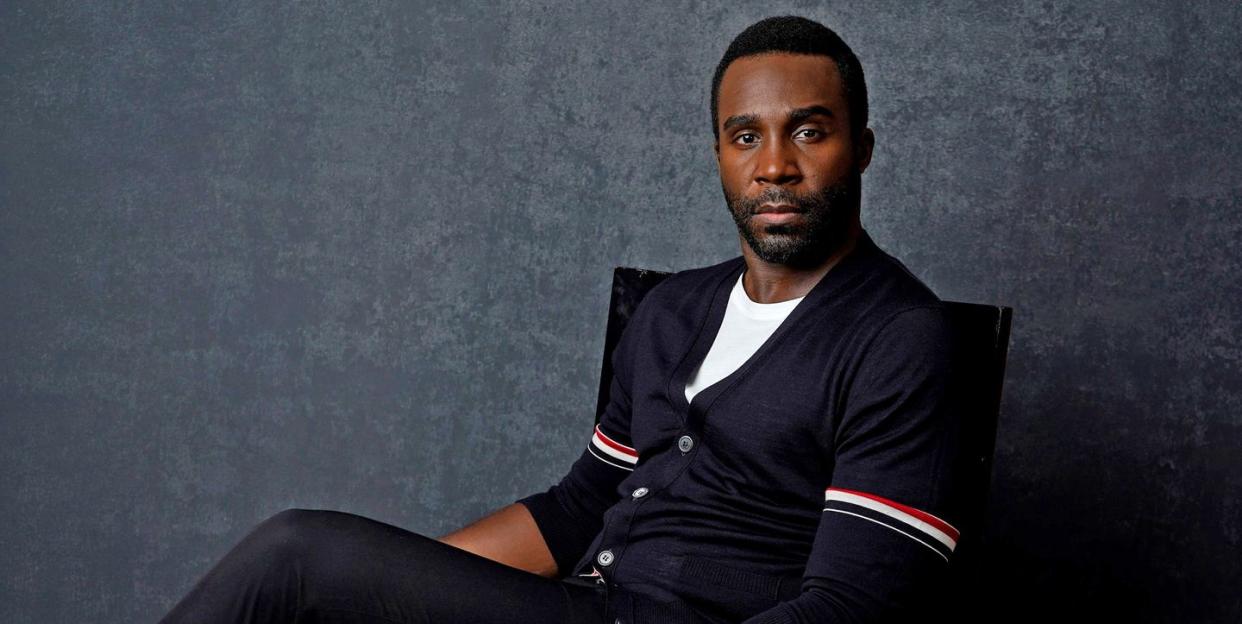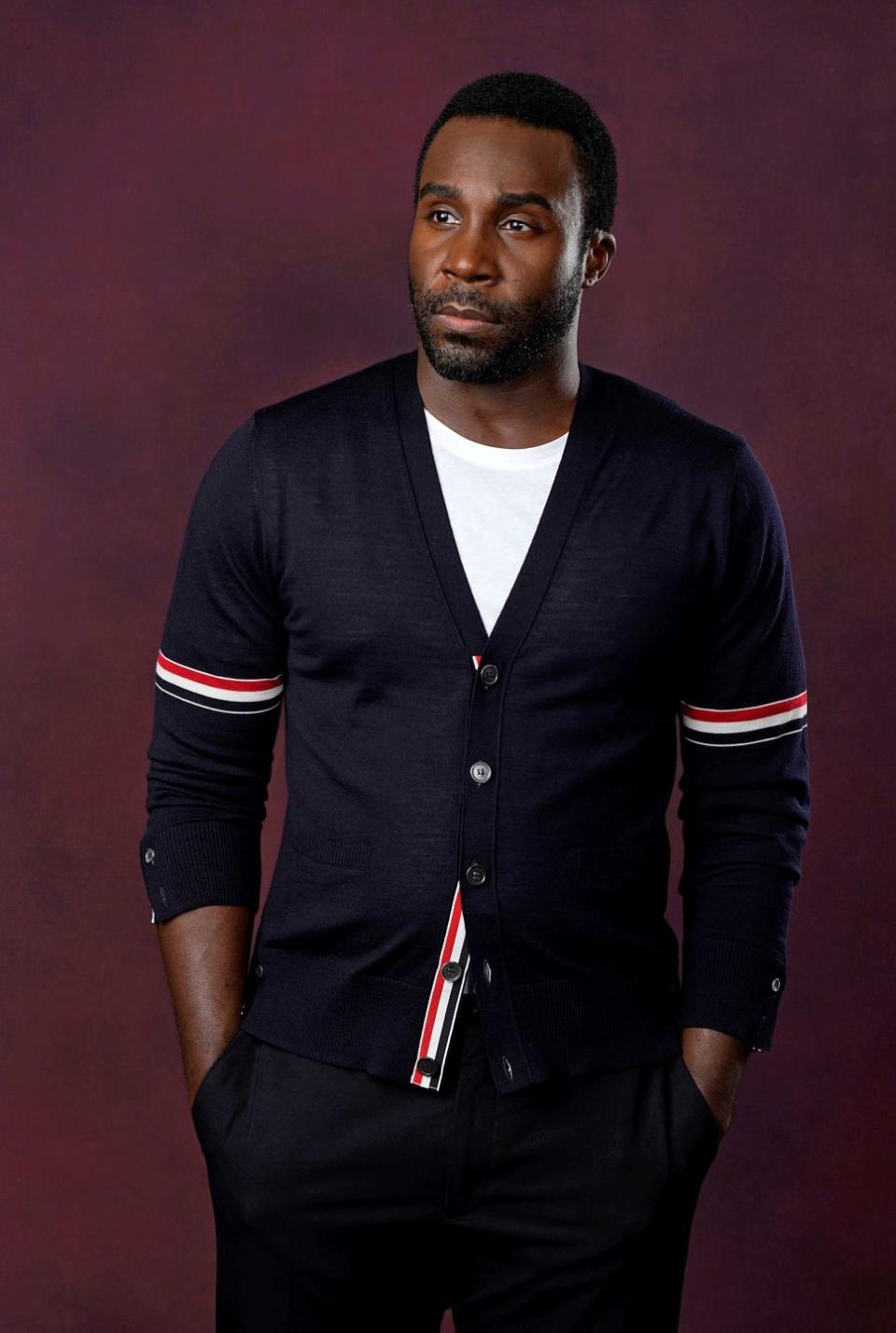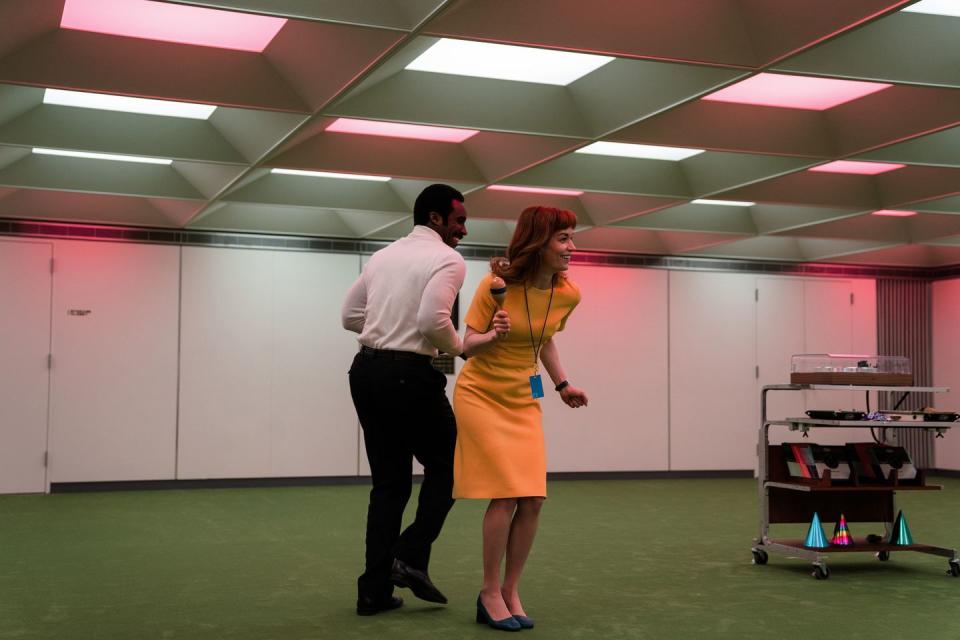Tramell Tillman Doesn't Want Any Trouble

- Oops!Something went wrong.Please try again later.
I don't want to make this weird. Really. But a couple of weeks ago, I had an odd sort of transcendental fan experience, the kind you only have at Comic-Con. Assuming you weren't there, this was the set up: Apple TV+'s breakout hit, Severance, damn near recreated the entire severed floor of Lumon Industries in San Diego. They hired a bunch of actors to play Lumon employees, who led fans through orientation day, trolling the absolute hell out of them, passing out maracas for a sick, twisted, IRL Music Dance Experience at the end of it all.
Hell, the creative team even got Tramell Tillman—who plays the menacing, yet oddly dance-inclined Lumon boss Mr. Milchick—to film a welcome video, in character. They even hired a doppelgänger Milchick for the experience, who led me to the office vending machine and asked me if I wanted raisins or pretzels, with the tone that said I'd end up in the break room if I picked the wrong snack. That's all to say, when I interviewed Tillman a week later and told him about Mr. Milchick #2, he went quiet. His lips curled into a smirk.
"Did you indulge and get raisins from the vending machine?"
You can see why Tillman's fellow Severance cast members say the man was genuinely scary when they filmed opposite him in full Milchick Mode. The 37-year-old actor, who joined Severance after a successful stretch working in various Broadway productions, plays the overseer of the Macrodata Refinement team in a way that is somehow condescending and genuine, sweet and sour, nefarious and warm—a way that signals that he's a man capable of both psychological torture and grooving effortlessly to defiant jazz.
Given that we're in limbo between Severance's early-summer season finale and the likely start of Season Two filming later this year, it feels like the perfect time to pick Tramell's brain about the future of the series, the time he almost became an orthopedic surgeon, and the art of saying no. This conversation has been edited for clarity and length.
ESQUIRE: I have a combo Milchick and life question. How powerful is belief?
Tramell Tillman: It's the cornerstone of who I am. Growing up, I started going to church when I was about 10 years old. My parents grew up in the Baptist religion. Baptist faith, Christian religion. And that was so much of my upbringing. I mean, in order to be an artist you have to have some level of faith, because we get rejected left and right. You have to be able to trust that the work you're doing is enough. You have to trust that you are enough.
So everything about me, and even Milchick, is about belief, about faith. The Lumon idea, it seems to be built in this belief of a higher structure, right? And we see Milchick as this guy who totally buys into it. So in order for it to resonate, in order for Milchick to really pop, he's got to be 100 percent sold on the Lumon brand.
Belief has helped me a lot during tough times, even though I no longer really practice any religion.
I mean, especially in the times that we're in now. Our world is turned upside down and inside out, and with social media we see every happening that's occurring all across the world. And you start to question humanity, you start to question these things that we were raised to believe in about country and civic duty. So to have an element of faith to fall back on to bolster you is truly important.
I have people close to me who say the opposite—that they've been pushed away because of what's happening. That's hard to hear, you know?
That is hard to hear. And that's understandable. It is. But my journey, my personal journey, I always find myself going back to the things that I've been taught and those lessons that really stuck with me.

Well, you’ve spoken before about the years in New York you spent hustling and running around, trying to make it as an actor. I know at one point in your life you were going to be a surgeon, too.
I had it in my head that I was going to be an orthopedic surgeon, but that was because I was told I'd never make it as an actor. I believed that. I believed that it was not a viable career for a Black man to enter into, and I would be a waiter for the rest of my life. It took many, many years and a lot of trials. A lot of lessons in the school of hard knocks for me to develop that faith and that confidence in who I am. But I also believe it was my own path of self-discovery, taking time to learn about who I am and what drives me, what I'm passionate about.
I remember a dear friend of mine said to me, "Tramell, I'm at an age where if I don't have to do something that I don't want to do, I'm not going to do it." And that was a lightbulb moment for me. It fueled me as an artist and as a man to discover my own autonomy and remind myself that I have the power to say no in an industry that may persuade you to believe that you shouldn't say no.
That's tough. I feel it too.
Listen, I'm still doing the work. It's a lot of self-work, you know? I spent a lot of time with myself reading and meditating, tapping into my faith, embracing, expanding my faith. And all of that has helped me stay focused on the work. It also helps my own perspective of how I see the art form. Telling stories for me as a form of ministry. Theater, in a way, it's church, you know?
We come together at a specific time. We're drawn by a specific purpose. We have roles and responsibilities within the theater, expectations. We stand when we're supposed to stand, we sit when we're supposed to sit, we respond when we're supposed to respond. We commune with one another. It's very much like church. And the intent is that we leave differently from how we walk through the doors.
It's a blessing to be able to tell those stories. The thing I struggle with, is that you get a platform to tell stories, but you have to maintain a level of authenticity, and make sure you’re doing things for the right reasons.
Oh, yeah. That's the challenge for me—the right reasons. Why are you doing this? It’s even heightened even more with the Black Lives Matter Movement in our industry. And now theaters, film, and television want to incorporate and diversify their landscape, but the question I always have is: are we doing this because we want to get people off our backs? Or are we doing it because inclusion is an important part of who we are as a society, and we should be telling these stories?
It’s a lot to consider.
It is. This is very deep. I don't mind it. I love having deep conversations. I don't get to do this too often.
The show's been out for so long, I can't waltz in and ask you about Milchick's personal life! But what I think is interesting about Severance is that it was created before the pandemic, but it became popular when people were returning to work after shuttering inside. I think the show wouldn’t have hit as hard if the pandemic never happened, and we were still grinding away in the office.
The timing was perfect. One of the many things that Severance brings up is the topic of self-awareness, knowing who you are, and the issues of the workplace in what we put our attention to. Also, how much time we spend at the workplace and what we are able to separate from. Because we're all shuttled in one space, we're forced to look at these topics. We're forced to ask these questions. And we can't forsake this flux of people who are bold enough to walk away from these jobs. The unemployment rate has skyrocketed. But a lot of people have walked away and said, "These job conditions don't work for me," or, "I want to try something else." And I believe Severance touches on that in many different ways.

Well, when people talk about Severance, it’s about corporate greed, and all the bad things. But I do think the show has something to say about good things at work, right? I mean, there's love between the MDR team.
Absolutely. I think it also speaks to the camaraderie that we develop when we're at work. Relationships, right? The budding love interests that happen there, but also MDR becomes this little family by Episode Seven. They band together and they're risking their own livelihoods to be able to fight the power, if you will. So it's really beautiful to watch how those bonds strengthen, and how they become big support systems for each other.
And the joy they find. I mean, I know the finger traps are supposed to be placating employees, but Dylan finds happiness in the prizes.
I have a friend of mine who reminds me often that joy is a choice. To choose joy.
People who don’t can spin out quickly.
Oh, yeah. I don't know how you can survive in the times that we are in now without some form of levity, joy, light, laughter, and hope. And I believe that in this dark, twisted world that we've created with Severance, there is that joy that pops in every now and then.
I’ll leave you with one question about the next season. We see Milchick dance, obviously, in Season One. I know you have a beautiful singing voice. So are we going to see Milchick sing in Season Two?
Oh, you're going to get in trouble! You're going to get me in trouble. I have no idea. That's in all honesty. I am not trying to evade the question. I have no idea. Ben and Dan are working as we speak, and I know they're going to craft something that is incredible, genius, and funny. So we'll see.
It’s going to be like Succession’s L to the OG moment, with some kind of Milchick ballad.
I'm going to cut an album after this, right?
You Might Also Like

